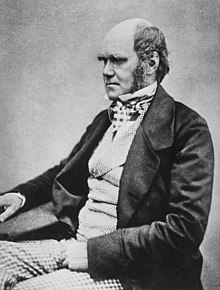
Back Charles Darwin Afrikaans Charles Darwin ALS ቻርልስ ዳርዊን Amharic Charles Darwin AN Charles Darwin ANG चार्ल्स डार्विन ANP تشارلز داروين Arabic تشارلز داروين ARY تشارلز داروين ARZ চাৰ্লছ ডাৰউইন Assamese
Charles Darwin | |
|---|---|
 Darwin, c. 1854, when he was preparing On the Origin of Species[1] | |
| Born | Charles Robert Darwin 12 February 1809 Shrewsbury, England |
| Died | 19 April 1882 (aged 73) Down, Kent, England |
| Resting place | Westminster Abbey |
| Alma mater | University of Edinburgh Christ's College, Cambridge (BA, 1831; MA, 1836)[2] |
| Known for | |
| Spouse | |
| Children | 10, including William, Henrietta, George, Francis, Leonard and Horace |
| Awards |
|
| Scientific career | |
| Fields | Natural history, geology |
| Institutions | Geological Society of London |
| Academic advisors | |
| Author abbrev. (botany) | Darwin |
| Author abbrev. (zoology) | Darwin |
| Signature | |
 | |
Preview warning: Page using Template:Infobox scientist with unknown parameter "parents"
Charles Robert Darwin (12 February 1809 – 19 April 1882) was an English naturalist.[5] He is famous for his work on the theory of evolution. Darwin's book On the Origin of Species was published in 1859. In this book, he put forward much evidence that evolution had occurred. He also proposed natural selection as the way evolution had taken place.
Darwin did not know about genetics: he never read the work of Gregor Mendel.[6] Nevertheless, Darwin's explanation of evolution was fundamentally correct. In contrast to Lamarck, Darwin's idea was that the giraffe's neck became longer because those with longer necks survived better.[7]p177/9 These survivors passed their genes on, and in time the whole species got longer necks.
- ↑ Freeman 2007, p. 76.
- ↑ "Charles Darwin's personal finances revealed in new find". 22 March 2009. Archived from the original on 19 October 2017 – via www.telegraph.co.uk.
- ↑ 3.0 3.1 3.2 3.3 3.4 Freeman 2007, p. 106.
- ↑ "Darwin Endless Forms » Darwin in Cambridge". Archived from the original on 23 March 2017.
- ↑ "Charles Darwin (1809 - 1882)". BBC. Retrieved 2011-11-03.
- ↑ The work of Mendel was not rediscovered until the early 20th century
- ↑ Darwin, Charles 1884. The origin of species. 6th ed, Murray, London.